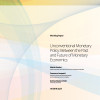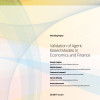In this work, we employ an agent-based integrated assessment model to study the likelihood of transition to green, sustainable growth in presence of climate damages. The model comprises heterogeneous fossil-fuel and renewable plants, capital- and consumption-good firms and a climate box linking greenhouse gasses emission to temperature dynamics and microeconomic climate shocks affecting labour productivity […]








